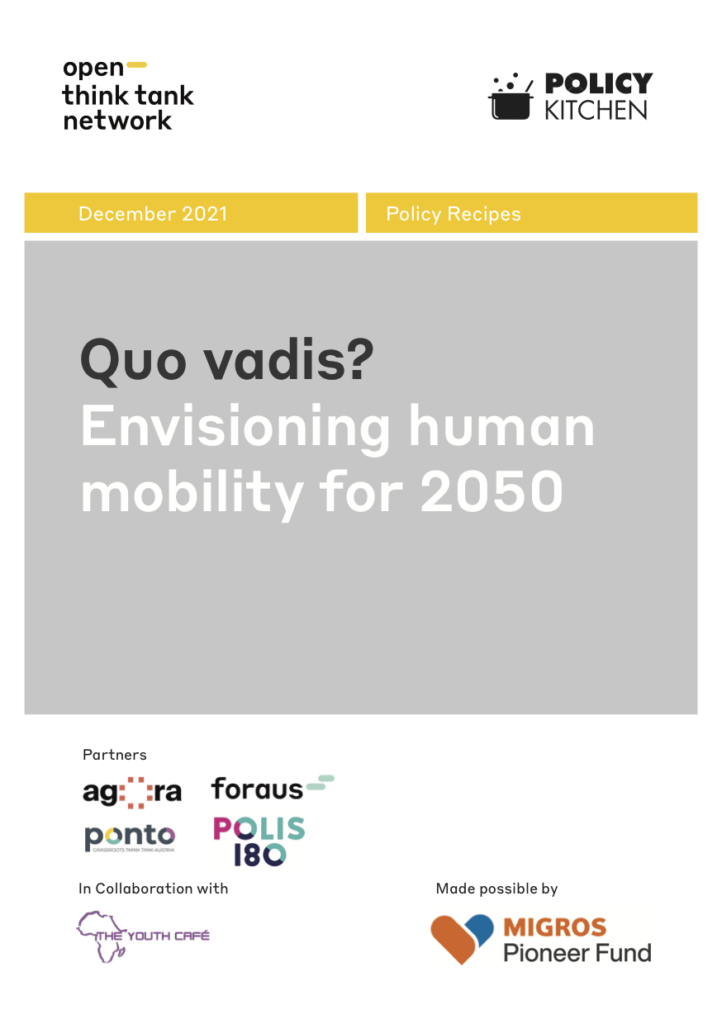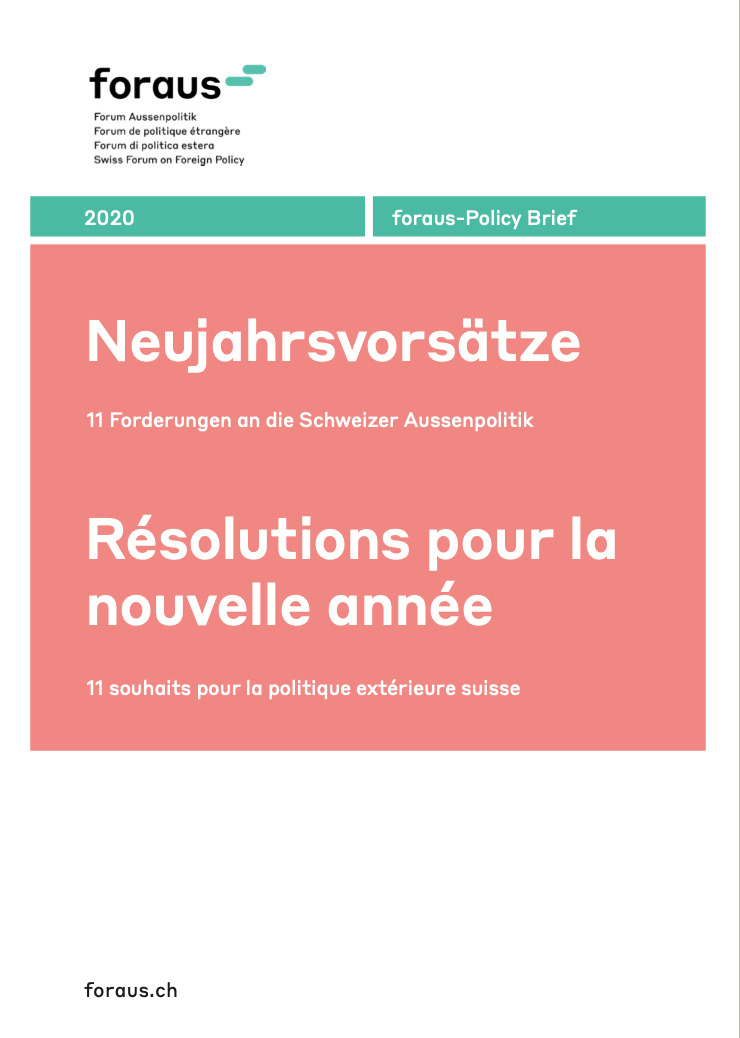Publications by Wailea Zülch

One year into the coronavirus pandemic that brought the world to a halt, the Open Think Tank Network’s grassroots think tanks partnered with the Kenyan-based youth empowerment organization, The Youth Café, to reflect on the impact of current transformative events on the various forms of migration. Recognizing that the future is unpredictable and with the aim of unraveling the range of possibilities it holds, a methodology to democratize strategic foresight was pioneered. The project engaged over one hundred participants from across the globe in a three-part workshop series and on the innovation platform Policy Kitchen. This report and an accompanying podcast series are the results of the participatory strategic foresight process. Diverse perspectives on the future of migration and crowd-sourced migration policy actions were ideated throughout the project. The project team regrouped the ideas into four key avenues for policymaking to set the political course for the participants’ visions of the future today, which are the following: Fair remuneration and inclusive working conditions; addressing the positive impact of migration on the social and economic challenges of an aging society; increase the decision-making power of cities and local level actors in migration management; and strengthening of urban-rural linkages in the context of climate change resilience and adaptation.

2020: Beginn der goldenen 20er Jahre? Auch wenn wir offiziell das neue Jahrzehnt erst nächstes Silvester feiern, so hat die Zwei in der Jahreszahl 2020 Bedeutung: Sie erinnert unter anderem an die 20er-Jahre des vergangenen Jahrhunderts. Das wilde Jahrzehnt 100 Jahre zuvor endete in einer enormen Krise. Steht uns ähnliches bevor? Wohin treibt die Weltpolitik in der kommenden Dekade? Unsere 11 Programme haben sich überlegt, welche aussenpolitischen Herausforderungen sich in ihrem Themenbereich im neuen Jahr stellen und welche Lösungsansätze möglich wären. Pessimismus generiert keinen Mehrwert, es braucht frisches Denken und politischer Einfallsreichtum für ein rosiges 2020. Wir arbeiten daran. Auf eine Zukunft, die wir gemeinsam prägen und erleben wollen.
2020, vers un retour des années folles ? Officiellement la nouvelle décen- nie ne débutera qu’à la veille du prochain Nouvel An. Pourtant, les deux 2020 sont significatifs : ils nous rappellent, entre autres, les années 1920. Mais est-ce que nos prochaines années ressembleront aux années 1920 qui se terminent par une énorme crise ? Serons-nous confronté·e·s à quelque chose de similaire ? Où donc va nous mener la politique mondi- ale au cours de la prochaine décennie ? Nos 11 programmes thématiques ont examiné les défis de politique étrangère auxquels ils seront con- frontés au cours de l’année à venir ainsi que les solutions envisageables. En effet, le pessimisme ne mène à rien. Ce dont nous avons besoin, ce sont des idées innovantes et des réflexions politiques pertinentes ; nous y travaillons. A un avenir que nous voulons façonner et vivre ensemble !
Die Veröffentlichung des derzeitigen Verhandlungsergebnisses zum institutionellen Abkommen (InstA) ist ein wichtiges Ereignis in den Beziehungen zwischen der Schweiz und der Europäischen Union (EU). Das Schicksal des Abkommens ist jedoch noch nicht besiegelt. Es ist fraglich, ob es im Frühling zu einer Paraphierung kommen wird, da sich die Schweiz derzeit innenpolitisch in einer Blockade befindet. Um aus der Sackgasse herauszufinden, sollten die Schweizer Behörden zunächst das Vertrauen der wichtigsten Sozialpartner, die gegen das InstA sind, wiederherstellen. Vor allem die Sozialpartner, die in der zweiten Hälfte 2018 die ganze Politik auf den Kopf stellten und seither das Abkommen aus Angst der Schwächung der flankierenden Massnahmen (FlaM) vehement bekämpfen, müssen beschwichtigt werden. Im Falle einer Reform dieser Massnahmen, gäbe es Lösungen und Ansätze zur Minderung der negativen Auswirkungen einer solchen Reform durch das InstA. Die EU lehnt die FlaM an sich nicht ab. Im Gegenteil, sie akzeptiert sie, sofern sie bestimmte allgemeine Grundsätze, besonders den Grundsatz der Nichtdiskriminierung, einhalten. In Anbetracht dieses Handlungsspielraums schlägt das folgende Papier vor, das Potenzial mehrerer Lösungsvorschläge zu untersuchen, um sicherzustellen, dass die Umsetzung der institutionellen Vereinbarung nicht zu weiteren Lohnunterbietungen führt.
Negotiations on the institutional framework agreement between Switzerland and the European Union (EU) have been dragging on for the past five years. Demands for such an agreement have been around even longer. The current logjam is over the Swiss labor rules. However, the EU has made it clear that «time is pressing and the window of opportunity is closing…» Swiss Foreign Minister Ignazio Cassis has lately said that it is «written in the stars» whether a breakthrough is possible by the end of the year. As the current debate is entirely focused around the question of the institutional framework agreement, there is even more uncertainty on what comes next. In point of fact, there is a risk of a gap between the conclusion of the institutional framework agreement and the launch of new market access negotiations. With this in mind, this policy brief proposes the inclusion of a provision whereby both parties pledge to continue negotiations on new market access agreements ex post conclusion of the institutional framework agreement without further delay.








